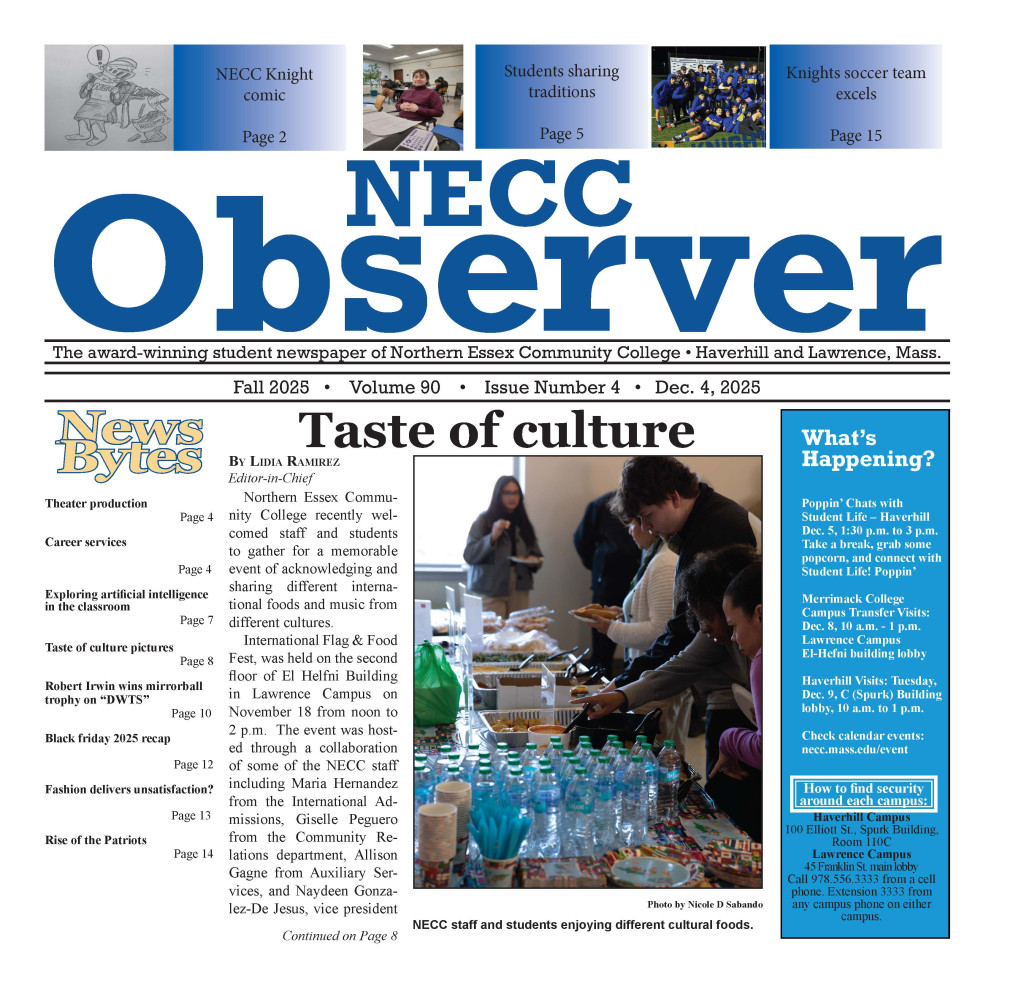By Justin Merced
The S.C.I.E.N.C.E. Club, pronounced “science,” will soon be open to students interested in science related activities such as in ecology and conservation, microscopy, necropsy, taxidermy and many different outdoor activities.
The S.C.I.E.N.C.E. Club had its first unofficial meeting on Tuesday, Feb. 17 and plans to begin holding official meetings on the first and third Tuesday of each month at 12:30 in room E365 on the Haverhill campus. All students are eligible to join.
There are hundreds of students enrolled as science majors at NECC, but there hasn’t been a special interest group in the sciences at NECC for several years. Mary Everett, founder and president of the S.C.I.E.N.C.E. Club and a biology and writing major at NECC, took note of this issue and decided to create a club for those interested in doing practical, but fun research.
“The Science Club will be based on student interest,” said Everett, also relating that it is intended to be a place where like-minded students can get together. “The club’s goal is to get people excited about science,” said Everett. “[And] give people the ability to do things they would otherwise not be able to do.”
The things Everett was referring to are the goals and activities she has planned for the S.C.I.E.N.C.E Club, which include salamander catching, water quality testing, taxidermy (on already deceased animals), necropsies on animals to gauge the impact of humans on the ecosystem, hiking and camping.
“There isn’t any one activity I’m most excited about,” said Everett.
Daniel Roache, S.C.I.E.N.C.E. Club vice president and biology major, however, has a more centralized view on what he plans to get out of club activities.
“I’m looking forward to doing taxidermy and dissections, but I’m more looking forward to having scientific discussions,” said Roache. Roache also said the S.C.I.E.N.C.E. Club will give him a chance to “stay up-to-date” with his knowledge and understanding of the sciences while taking elective courses at NECC, which may be considered a serious issue among science transfer students.
Roache will not be returning to NECC in the fall, but said he plans to “expand the club to ensure its survival.” Everett, who will also not be returning to NECC in the fall, also plans for a great expansion.
Everett intends to become a full-time student at the UMass Lowell beginning in the fall of 2015 but hopes to create a “bridge” program or network between UMass Lowell’s science program and NECC in order to fashion more effective experiences for future S.C.I.E.N.C.E. Club members. Everett also said she intends to eventually involve the S.C.I.E.N.C.E. Club in eco-based nonprofits in the New England area.
Sarah Courchesne, who is one of two S.C.I.E.N.C.E. Club advisers, a professor of chemistry and biology at NECC, and also Mary Everett’s older sister has similar goals in regards to student and club success.
Courchesne intends to strengthen the club by providing lasting support for students, although she’d like it to mostly remain “student driven.” In regards to student success, Courchesne, who is also a doctor of veterinary medicine, said she’d like to use her connections from within the scientific research field to “get students into the science world,” meaning she’d like to assist them in reaching their career goals if interested in a profession in the sciences.
Courchesne also has a strong focus on outdoor activities, and said she is “excited to see where this leads.”
In addition, when asked about what each letter in the name “S.C.I.E.N.C.E.” stands for, Everett simply stated one would simply have to join to find out.
For more information, you can contact S.C.I.E.N.C.E. Club president Mary Everett at Mary_Everett@student.uml.edu, advisor Sarah Courchesne at Scourchesne@necc.mass.edu, or advisor Mark Clements at Mclements@necc.mass.edu.

